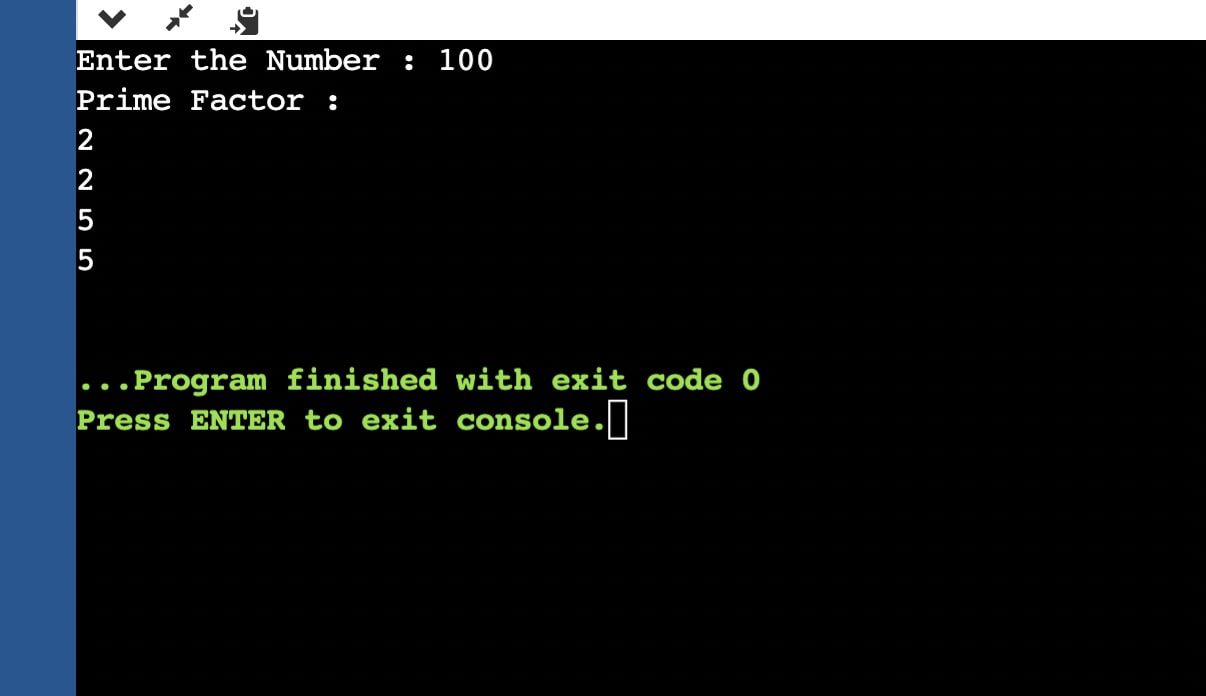If a number p is fully divisible by another number q, then q is said to be a factor of p. Here q will be greater than 1 and less than or equal to p.
So, if a number p is fully divisible by another number q and q is a prime number then q is said to be a prime factor of p.
Prime numbers are those numbers that are only divisible by 1 and themselves. In this article, we will see the code to find the prime factors of a number.
For example:
If we take 5, then prime factors will be:
5 = 5
5 is the only prime factor of 5.
If we take 20, then prime factors will be:
20 = 2 * 2 * 5
If we take 210, then prime factors will be:
210 = 2 * 3 * 5 * 7
Now let’s see the code of this problem. In this code, we will be creating two functions. The first function will help us to know if a number is prime or not. And the second function will help us to print the prime factor of a number.
def isPrime(n):
"""
Function to return if a number is prime or not
Input : A Number
Output : Boolean Value True or False
"""
# If the Number is less than 2, then returns False
if n < 2:
return False
# loop from 2 to n-1, if between this range n is divided by any number
# then return False
# else return true in the end.
for i in range(2, n):
if (n % i == 0):
return False
return True
# Function to print the prime factors of a number.
def primeFactor(n):
"""
Function to print the prime factors of a number.
Input : Number
Output : None. It will print the prime factors from the function only.
"""
if (n < 2):
print("No Prime Factors")
return
i = 2
# Loop while i is not equal to n
while (i < n+1):
# if n is divisible by i and i is a prime number then we have to
# print the vlaue of i and update the value of n by dividing it by i.
# else we just have to increment the value of i by 1.
if (n % i == 0 and isPrime(i)):
print(i) # print the value of i
n = n / i # update the value of n
else:
i += 1 # Increase the value of i by 1
# Take the number as input from user in the string format
number = input("Enter the Number : ")
# Convert the string datatype into integer datatype
number = int(number)
# Call the function to print the prime factors of the inputted number
print("Prime Factor : ")
primeFactor(number)
Testcase 1: When the input is 100.
Output:
PS C : \ Users \ ASUS \ Desktop \ Crazy Programmer Work > python -u " c : \ Users \ ASUS \ Desktop \ Crazy Programmer Work \ test.py " Enter the Number : 100 Prime Factor : 2 2 5 5
Testcase 2: When the Input is 270270.
Output:
PS C : \ Users \ ASUS \ Desktop \ Crazy Programmer Work > python -u " c : \ Users \ ASUS \ Desktop \ Crazy Programmer Work \ test.py " Enter the Number : 270270 Prime Factor : 2 3 3 3 5 7 11 13

We have used two functions to create the whole program.
The first function will tell us if a number is prime or not. It takes an integer and returns a Boolean value (True or false).
The second function will help to print the prime factors of a number. It will take an integer as input and print all the prime factors of that input. It returns None because all the printing is done within the function only.
The post Python Program to Find Prime Factors of a Number appeared first on The Crazy Programmer.
from The Crazy Programmer https://ift.tt/h7RbxdI
Post a Comment